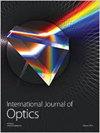Effect of Co-Doping on the Photoelectric Properties of the Novel Two-Dimensional Material Borophene
IF 1.8
4区 物理与天体物理
Q3 OPTICS
引用次数: 0
Abstract
Borophene is a novel two-dimensional material with abundant crystal structure and photoelectric properties. We focus on the effect of co-doping on the electronic structure and optical properties of borophene using the first-principles method. The results show that the structure of Al and Ga co-doped borophene is obviously distorted because Al and Ga atoms have formed bonds with a bond length of 2.378 Å, and the two B atoms that bond together with Al and Ga are no longer formed bonds. However, it is also a two-dimensional planar structure after co-doping. After co-doping, the band gap width of the borophene system is narrowed from 1.409 eV to 1.376 eV, and the band gap is narrowed by 0.033 eV. Mulliken population analysis shows an obvious charge transfer between Al-B and Ga-B atoms in the co-doped borophene. The calculation of optical properties shows that the static dielectric constant ε1 (0) increases from 5.08 to 7.01, and ε2 (ω) is larger than that of the undoped sample in the low-energy range. Thus, the co-doping of Al and Ga can enhance the electromagnetic energy storage capacity and the visible light absorption ability. Although the reflectance of borophene is reduced by co-doping (the peak of the reflectivity can be decreased from 71% to 61% at E = 2.94 eV), it still presents metallic reflection characteristics. The static refractive index n0 can be increased from 2.25 to 2.65 by co-doping. The extinction coefficient shows strong band edge absorption at the low-energy range with an absorption edge of 0.85 eV. The light loss is limited to a very narrow energy range of approximately 7.30 eV, which indicates that borophene co-doped with Al and Ga can also be used as a light storage material. The optical conductivity reaches its maximum at E = 1.78 eV and 2.52 eV, which correspond to the light irradiation with a wavelength of 698 nm (red light) and 492 nm (cyan light), respectively. The results show that the Al-Ga co-doped borophene is sensitive to cyan light and red light, so it can be used to make photosensitive devices. The results can hopefully fill the gap in the application of borophene in semiconductor photoelectric devices and provide a theoretical basis for its application.共掺杂对新型二维材料硼罗芬光电性能的影响
硼罗芬是一种具有丰富晶体结构和光电性能的新型二维材料。利用第一性原理方法研究了共掺杂对硼罗芬电子结构和光学性质的影响。结果表明,Al和Ga共掺杂硼罗烯的结构明显扭曲,因为Al和Ga原子形成了键长为2.378 Å的键,而与Al和Ga结合的两个B原子不再形成键。但共掺杂后也是二维平面结构。共掺杂后,硼罗芬体系的带隙宽度从1.409 eV缩小到1.376 eV,带隙缩小了0.033 eV。Mulliken居群分析表明,共掺杂硼罗芬中Al-B和Ga-B原子之间存在明显的电荷转移。光学性质计算表明,样品的静态介电常数ε1(0)由5.08增加到7.01,且在低能范围内ε2 (ω)大于未掺杂样品。因此,Al和Ga的共掺杂可以增强电磁储能能力和可见光吸收能力。虽然共掺杂降低了硼罗芬的反射率(在E = 2.94 eV时,反射率峰值从71%下降到61%),但仍具有金属反射特性。通过共掺杂可以将静态折射率n0从2.25提高到2.65。消光系数在低能量范围表现出较强的带边吸收,吸收边为0.85 eV。光损失被限制在7.30 eV的非常窄的能量范围内,这表明硼罗芬与Al和Ga共掺杂也可以用作光存储材料。光导率在E = 1.78 eV和2.52 eV处达到最大值,对应于光辐照波长分别为698 nm(红光)和492 nm(青光)。结果表明,Al-Ga共掺杂硼罗芬对青色光和红光敏感,可用于制作光敏器件。该结果有望填补硼罗芬在半导体光电器件中应用的空白,并为其应用提供理论依据。
本文章由计算机程序翻译,如有差异,请以英文原文为准。
求助全文
约1分钟内获得全文
求助全文
来源期刊

International Journal of Optics
Physics and Astronomy-Atomic and Molecular Physics, and Optics
CiteScore
3.40
自引率
5.90%
发文量
28
审稿时长
13 weeks
期刊介绍:
International Journal of Optics publishes papers on the nature of light, its properties and behaviours, and its interaction with matter. The journal considers both fundamental and highly applied studies, especially those that promise technological solutions for the next generation of systems and devices. As well as original research, International Journal of Optics also publishes focused review articles that examine the state of the art, identify emerging trends, and suggest future directions for developing fields.
 求助内容:
求助内容: 应助结果提醒方式:
应助结果提醒方式:


